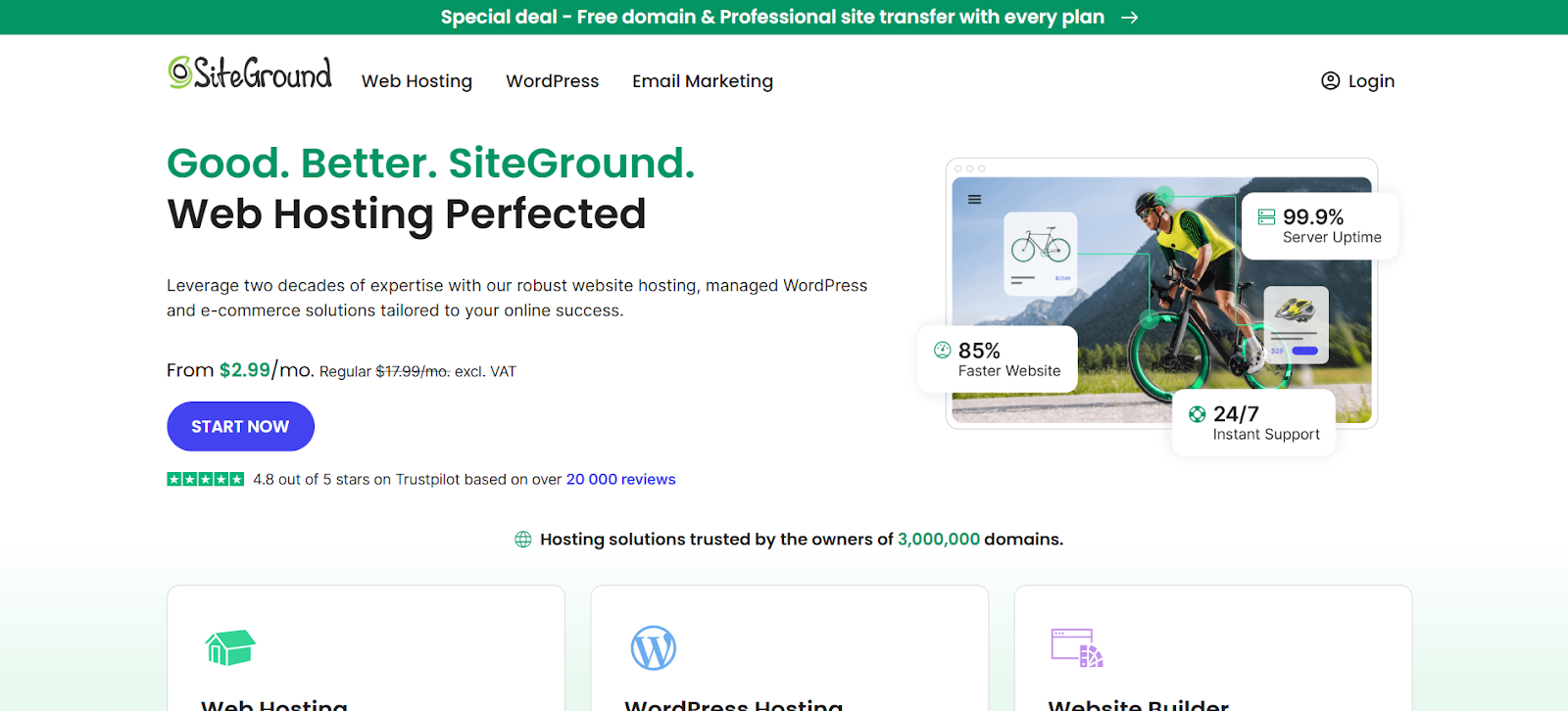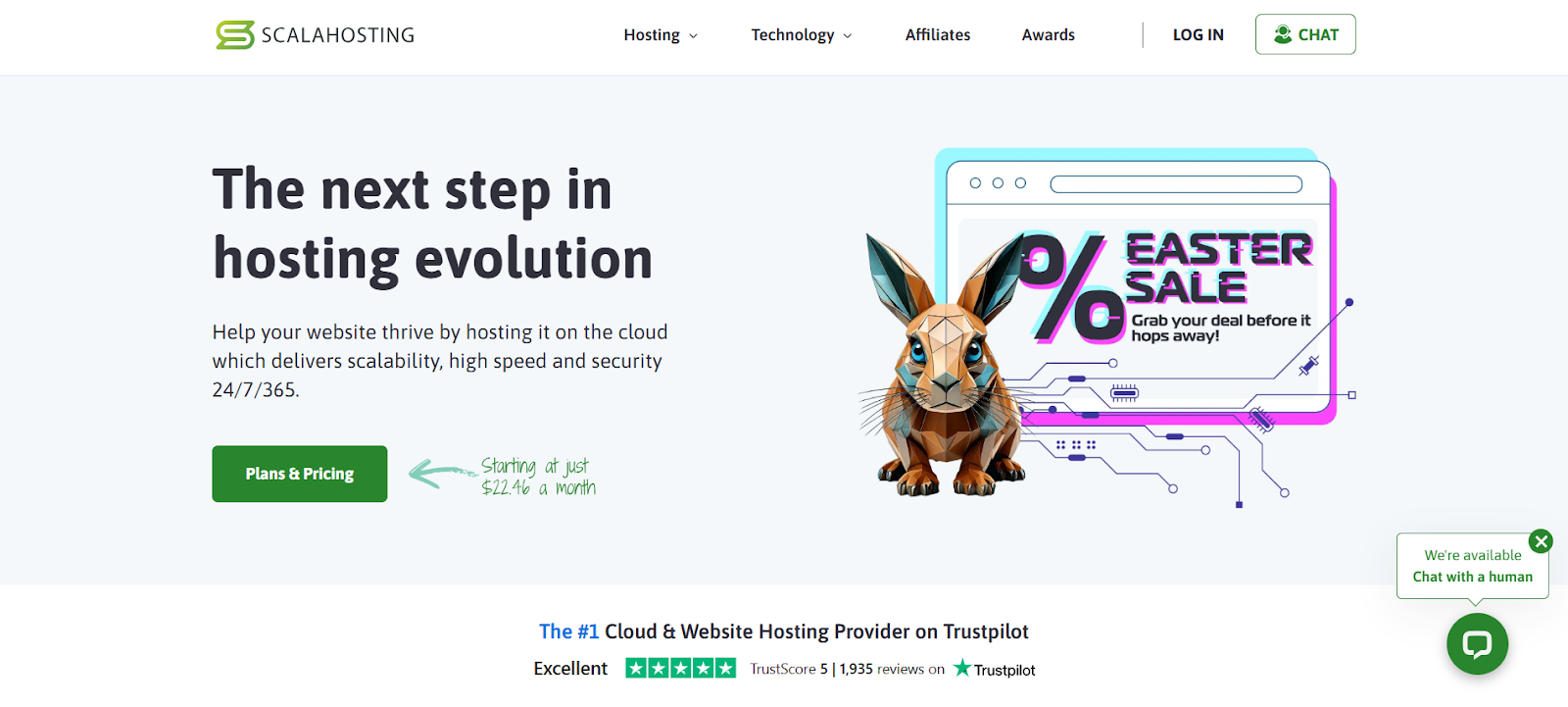Table of Contents
-
- Hosting Tuned for WordPress/WooCommerce
- Define Your Website’s Hosting Needs
- Planning Hosting for Future Site Growth
- Managing Your Web Hosting Budget Wisely
- Why Hosting Reliability & Uptime Matter
- Faster Speeds with NVMe Server Storage
- The Value of 24/7 Expert Hosting Support
- Need for an Easy-to-Use Control Panel
- Conclusion
We will look at three popular options: SiteGround, ScalaHosting, and Elementor Hosting. We aim to help you find the best fit for your specific needs in 2025. Let’s dive in.
SiteGround vs ScalaHosting vs Elementor Hosting
Choosing a web host involves comparing many factors. Features, performance, support, and pricing all play a role. Let’s compare SiteGround, ScalaHosting, and Elementor Hosting. We will examine their key strengths and who might benefit most from each.
Elementor Hosting: All-in-One Solution for WordPress Websites
Elementor Hosting offers a managed hosting environment. It’s built specifically for WordPress sites, especially those using the Elementor page builder. The service runs on the Google Cloud Platform’s C2 servers, providing a strong and scalable foundation. It also includes Cloudflare Enterprise CDN, which helps deliver content quickly around the globe.
Key Features & Benefits:
- Managed WordPress Environment: Handles technical hosting tasks. This lets you focus on building your site.
- Google Cloud Infrastructure: Provides reliable and high-performance hosting.
- Cloudflare Enterprise CDN: Improves global loading speeds and adds security.
- Integrated Solution: Designed to work seamlessly with WordPress and Elementor (Core version included).
- Automatic Backups: Daily backups ensure your data is safe. Easy restoration options are available.
- Staging Environment: Test changes safely before pushing them live.
- Built-in Security: Includes SSL certificates, malware scanning, and DDoS protection.
- Dedicated Support: Access to experts familiar with WordPress and Elementor.
Potential Considerations:
- Elementor Hosting includes the Elementor Core plugin. You need to purchase Elementor Pro separately if you need its advanced features.
- It is primarily designed for WordPress websites that use Elementor.
Who is it Best For?
Elementor Hosting is an excellent choice for designers, agencies, and businesses building websites with WordPress and Elementor. It simplifies the technical side of hosting. The platform provides an optimized environment right out of the box, with Elementor Pro included in most plans. If you value convenience, seamless integration, and strong performance within the Elementor ecosystem, this is a compelling contender. The managed nature means you spend less time on server maintenance.
SiteGround Review

SiteGround is a well-known hosting provider. Many WordPress users recommend it. The company offers various hosting types. These include shared, cloud, and dedicated server options. SiteGround focuses heavily on speed and security technologies, running on Google Cloud infrastructure.
Key Features & Benefits:
- Performance Focus: Uses NGINX servers, SSD storage (including NVMe on higher plans), and custom caching (SuperCacher).
- WordPress Optimized: Offers tools like automatic updates, staging environments, and WP-CLI access.
- Security Measures: Provides a custom WAF, an AI anti-bot system, free SSL, and daily backups.
- Customer Support: Known for responsive and knowledgeable 24/7 customer service.
- Data Centers: Operates multiple data centers on different continents.
- User-Friendly Interface: Uses a custom Site Tools control panel instead of the traditional cPanel.
Potential Considerations:
- Pricing can increase significantly after the initial term. (Fact Check confirms high renewal rates)
- Storage limits on shared plans might affect very large sites.
Who is it Best For?
SiteGround appeals to a broad audience. Beginners appreciate its ease of use and the support it offers. Developers value the performance tools and staging features. Businesses often rely on their uptime track record and security focus. It’s a solid all-around option for various types of WordPress websites. Those who need strong performance and reliable support often consider SiteGround.
ScalaHosting Review

ScalaHosting stands out, particularly for its managed VPS hosting solutions. They offer their own control panel, SPanel. This serves as an alternative to cPanel, especially on their VPS plans. The company emphasizes security and performance.
Key Features & Benefits:
- Managed VPS Focus: Offers affordable managed Virtual Private Server (VPS) plans with dedicated resources.
- SPanel Control Panel: A proprietary control panel designed for VPS management. It includes tools like the WordPress Manager.
- Security Emphasis: Provides the SShield Security suite (real-time protection), daily backups, and free SSL certificates.
- NVMe SSD Storage: Uses fast NVMe storage across its hosting plans.
- Customer Support: Offers 24/7 support via chat, tickets, and phone.
- Free Migration: Helps users transfer websites from other hosting providers.
Potential Considerations:
- SPanel, while functional, might require some learning for users accustomed to cPanel.
- While shared hosting plans exist, the company’s main focus is VPS.
Who is it Best For?
ScalaHosting is particularly attractive for users seeking the power and control of a VPS. It suits those who want this without the high cost or complexity often associated with it. Small businesses, developers, and agencies that need more resources than shared hosting offers find managed VPS plans appealing. The SPanel and SShield security features provide unique value. If you need a robust VPS solution with strong security and dedicated support, ScalaHosting is worth exploring.
Grow Your Sales
- Incredibly Fast Store
- Sales Optimization
- Enterprise-Grade Security
- 24/7 Expert Service

- Incredibly Fast Store
- Sales Optimization
- Enterprise-Grade Security
- 24/7 Expert Service
- Prompt your Code & Add Custom Code, HTML, or CSS with ease
- Generate or edit with AI for Tailored Images
- Use Copilot for predictive stylized container layouts

- Prompt your Code & Add Custom Code, HTML, or CSS with ease
- Generate or edit with AI for Tailored Images
- Use Copilot for predictive stylized container layouts
- Craft or Translate Content at Lightning Speed
Top-Performing Website
- Super-Fast Websites
- Enterprise-Grade Security
- Any Site, Every Business
- 24/7 Expert Service

Top-Performing Website
- Super-Fast Websites
- Enterprise-Grade Security
- Any Site, Every Business
- 24/7 Expert Service
- Drag & Drop Website Builder, No Code Required
- Over 100 Widgets, for Every Purpose
- Professional Design Features for Pixel Perfect Design

- Drag & Drop Website Builder, No Code Required
- Over 100 Widgets, for Every Purpose
- Professional Design Features for Pixel Perfect Design
- Marketing & eCommerce Features to Increase Conversion
- Ensure Reliable Email Delivery for Your Website
- Simple Setup, No SMTP Configuration Needed
- Centralized Email Insights for Better Tracking

- Ensure Reliable Email Delivery for Your Website
- Simple Setup, No SMTP Configuration Needed
- Centralized Email Insights for Better Tracking

- Ensure Reliable Email Delivery for Your Website
- Simple Setup, No SMTP Configuration Needed
- Centralized Email Insights for Better Tracking
Selecting the Best Hosting Plan for You
Choosing the right host requires careful thought. Do not just pick the cheapest option. Consider your website’s current and future needs. Let’s break down the key factors.
Hosting Tuned for WordPress/WooCommerce
Does the host specialize in WordPress? Look for features that make managing WordPress easier. These include one-click installs, automatic updates, and built-in caching optimized for WordPress. For e-commerce sites using WooCommerce, check for specific optimizations. Features like server-level caching, which work well with online stores, are important. Good hosts understand how WordPress works. They tune their servers to match.
Define Your Website’s Hosting Needs
What kind of website are you building? A simple blog has different needs than a large online store or a membership site. Estimate your expected traffic. Consider the amount of storage space you will need for files, images, and databases. Will you host videos or large files that can be downloaded? Knowing these details helps you choose the right plan level. Do not pay for resources you will not use. But do not underestimate your needs either.
Planning Hosting for Future Site Growth
Think about where you want your website to be in a year or two. Will your traffic increase? Will you add more complex features? Choose a host that makes scaling your resources easy. Can you easily upgrade your plan? Does the host offer options like cloud hosting or a virtual private server (VPS)? These provide more power when needed. Planning for growth avoids difficult migrations later. Look for hosts with clear upgrade paths.
Managing Your Web Hosting Budget Wisely
Hosting costs vary widely. Shared hosting is usually the cheapest. VPS and dedicated servers cost more. Managed hosting often carries a higher price tag but saves you time on technical tasks. Consider the total cost. Include renewal rates, not just introductory prices. Factor in the costs of extras like domain names, SSL certificates (if not included for free), and premium support. Balance cost with the features and reliability you need.
Why Hosting Reliability & Uptime Matter
Uptime refers to the percentage of time your website is online and accessible. Look for hosts that guarantee 99.9% uptime or higher. Downtime means lost visitors, lost sales, and a damaged reputation. Reliable hosting is essential. Check reviews and uptime reports for potential hosts. A Service Level Agreement (SLA) outlining uptime guarantees is a positive sign.
Faster Speeds with NVMe Server Storage
Storage technology impacts site speed. NVMe (Non-Volatile Memory Express) SSDs are significantly faster than traditional SATA SSDs and older hard disk drives (HDDs). Faster storage means quicker data retrieval. This leads to faster page load times. Many top hosts now offer NVMe storage, at least on higher-tier plans. If speed is critical for your site, prioritize hosts using NVMe technology.
The Value of 24/7 Expert Hosting Support
When problems arise, you need help quickly. Look for hosts that offer 24/7 support through multiple channels, such as chat, phone, and tickets. Test their responsiveness before signing up. Is the support team knowledgeable about WordPress and common issues? Good support can save you hours of frustration. Check if they offer specialized WordPress support.
Need for an Easy-to-Use Control Panel
The control panel is your dashboard for managing your hosting account. Common options include cPanel, Plesk, or custom panels like SiteGround’s Site Tools or ScalaHosting’s SPanel. Elementor Hosting offers a streamlined dashboard that is integrated with WordPress. Choose a panel you find intuitive. It should make tasks like managing files, databases, email accounts, and backups straightforward.
Key Factors for Smooth Hosting Migration
Moving your website to a new host can be a challenging process. But with careful planning, it can be a smooth process. Let’s cover the essential steps for a successful migration.
Understanding the Data Transfer Steps
Migrating involves moving two main things: your website files and your database.
- Backup: Always start with a complete backup of your current site.
- File Transfer: Download website files (such as HTML, CSS, PHP, images, etc.) from your old hosting provider. Use FTP or a file manager. Then, upload them to your new host.
- Database Transfer: Export your database (typically MySQL) from your old hosting provider. Create a new database on your new host. Then, import the exported file.
- Configuration Update: Update configuration files, such as wp-config.php for WordPress. Enter the new database details.
- Testing: Thoroughly test your site on the new host before pointing your domain. Many hosts provide a temporary URL for this step.
Some hosts offer free or paid migration services. These services can significantly simplify the process. Tools like WordPress migration plugins (e.g., Duplicator, Migrate Guru) can also automate many steps.
Handling Your Domain Name During Moves
Your domain name needs to point to the new host’s servers. You do this by updating the Domain Name System (DNS) records. Specifically, you update the nameservers or A records.
- Nameservers: Point your entire domain’s DNS management to the new host.
- A Record: Point just the web traffic to the new host’s IP address. This keeps DNS management elsewhere.
DNS changes can take up to 48 hours to spread worldwide. Plan the timing carefully to minimize disruption. You usually update DNS settings through your domain registrar’s control panel.
Choosing Where to Host Your Emails
If your email accounts use your domain name (e.g., you@yourdomain.com), decide where you want them to live after the move.
- With the New Host: Many hosts offer email hosting. You will need to recreate email accounts. You might also need to migrate old emails.
- Third-party service: Use a dedicated email provider, such as Google Workspace or Microsoft 365. This separates email from web hosting. Many experts recommend this approach.
- With the Old Host: This is sometimes possible, but it’s usually not ideal in the long term.
Ensure your MX (Mail Exchanger) records in your DNS settings point to the correct email server.
Tips to Prevent Downtime When Migrating
The goal is zero downtime. Here is how to achieve it:
- Test Thoroughly: Use the temporary URL or modify your hosts file. Fully test the site on the new server before changing DNS.
- Lower TTL: Reduce the Time-To-Live (TTL) value for your DNS records several hours before the switch. This helps DNS changes spread faster.
- Schedule Wisely: Perform the final DNS switch during your website’s lowest traffic period.
- Keep Your Old Hosting Active: Don’t cancel your old hosting immediately. Keep it running for a few days after the switch as a fallback measure.
Using Simple One-Click Migration Tools
Many WordPress hosts offer specialized migration plugins or tools. Elementor Hosting, for example, helps with migrations. SiteGround has its own migration plugin. These tools often automate file and database transfers. They can significantly simplify the process, especially for less technical users. Check if your chosen host provides such a tool.
Boosting Site Performance on New Hosting
Moving to a better host is often the first step toward a faster website. But you can usually optimize further. Let’s explore ways to maximize performance on your new hosting platform.
Actionable Performance Tuning Tactics
Beyond good hosting, several factors impact speed:
- Optimize Images: Compress images without losing visual quality. Use modern formats like WebP when possible.
- Minimize Code: Remove unused CSS and JavaScript code. Minify your code files to reduce their size.
- Reduce HTTP Requests: Combine files like CSS and JavaScript where possible. Use CSS sprites for small images, such as icons.
- Optimize Database: Regularly clean up your website’s database. Remove old post revisions, transients, and spam comments. Tools like WP-Optimize can help automate this.
- Choose a Lightweight Theme: Bloated themes can significantly slow down sites. Pick a well-coded, performance-focused theme.
- Limit Plugins: deactivate and delete any unnecessary ones. Poorly coded plugins are a common reason for slow site speed.
Using Caching & CDN for Faster Loading
Caching: Stores copies of your site’s files closer to the user or in server memory. This speeds up content delivery.
- Browser Caching: Tells returning visitors’ browsers to load files from their local cache instead of downloading them again.
- Page Caching: Saves static HTML versions of your dynamic pages. The server does not need to rebuild pages for every visitor. Managed hosts often handle this. Plugins like WP Rocket or W3 Total Cache can also manage page caching.
- Object Caching: Speeds up database queries for faster dynamic content generation. This is often done at the server level using tools like Redis or Memcached.
Content Delivery Network (CDN): A network of servers distributed globally. A CDN stores copies of your static files, such as images, CSS, and JS. Visitors load these files from the server closest to them. This reduces latency and speeds up loading times. Cloudflare is a popular CDN. Elementor Hosting includes its powerful Enterprise version.
Gains from Cloud Infrastructure Hosting
Hosting platforms built on cloud infrastructure offer significant advantages. Elementor Hosting, for instance, uses Google Cloud. Benefits include:
- Scalability: Easily adjust resources (CPU, RAM) up or down based on traffic demands. You only pay for what you need.
- Reliability: Cloud platforms are built with built-in redundancy. If one server component fails, others take over seamlessly.
- Performance: Access to powerful hardware and highly optimized networks. Often includes features like automatic load balancing.
Cloud hosting generally provides better performance and uptime compared to traditional shared hosting environments.
Essential Regular Maintenance Routines
Keeping your site fast requires ongoing effort:
- Updates: Regularly update the WordPress core, themes, and plugins. Updates often include performance improvements and vital security patches.
- Backups: Ensure automated backups are running correctly. Test the restoration process periodically to ensure backups are valid.
- Performance Monitoring: Use tools like Google PageSpeed Insights or GTmetrix. Regularly check your site speed to identify new bottlenecks.
- Database Cleanup: Schedule regular database optimization tasks to keep it running efficiently.
Conclusion
Choosing the right web hosting provider is fundamental to your online presence. It impacts everything from site speed and reliability to security and scalability. We have looked at the features and strengths of SiteGround, ScalaHosting, and Elementor Hosting. We also covered key considerations like migration, performance tuning, and security best practices.
For users building websites with WordPress, especially those using the power of the Elementor page builder, Elementor Hosting presents a compelling option. Its managed environment runs on the robust Google Cloud Platform and integrates with Cloudflare Enterprise CDN. This setup is specifically tuned for WordPress and Elementor performance. Features like automatic backups, built-in security, staging environments, and dedicated support streamline technical tasks.

Crucially, most plans include the valuable Elementor Pro plugin, providing advanced design tools right away. This allows creators and businesses to focus more on design, content, and growth. If you’re looking for an all-in-one, optimized, and managed solution for your Elementor-powered WordPress site, Elementor Hosting offers a powerful and convenient platform designed to meet your needs effectively. Making an informed hosting choice sets your website up for success today and in the years to come.
Looking for fresh content?
By entering your email, you agree to receive Elementor emails, including marketing emails,
and agree to our Terms & Conditions and Privacy Policy.

